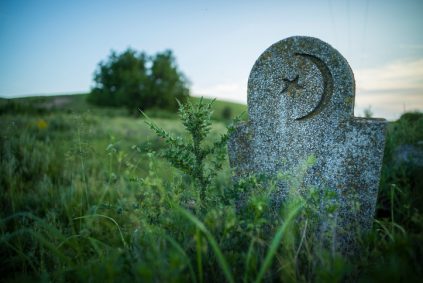
Imagine that a woman in the midst of a miscarriage, bleeding heavily, arrived at her local emergency room for treatment. The pregnancy could not be saved. Indeed, while waiting for medical attention the mother passed the products of conception in their entirety and the bleeding stopped. The tissue would ordinarily be treated as medical waste, incinerated and sent to a sanitary landfill. Of course, if she chose, the mother could arrange for a private burial.
However, this local hospital is an Islamic hospital, and operates on the principles of Sharia Law. The mother is informed that the tissue will be buried in an Islamic cemetery with a burial service conducted by an imam. If she did not want an Islamic burial, she could pay for a private burial at her expense.
[pullquote align=”right” cite=”” link=”” color=”” class=”” size=””]Why is it acceptable to allow Catholic hospitals to impose Catholic doctrine on non-Catholics?[/pullquote]
The outrage of political conservatives would know no bounds. Despite zero evidence, many already fear that Muslim Americans wish to impose Sharia Law on non-Muslims. A hospital operating under Sharia Law would confirm their fears. It hasn’t happened yet simply because there are no Muslim hospitals in the US. But conservatives would be absolutely correct in opposing a hospital’s imposition of Muslim Law on non-Muslims as a violation of religious freedom.
So why do they find it completely acceptable to allow Catholic hospitals to impose Catholic doctrine on non-Catholics?
According to Sophie Novack of The Texas Observer:
A Catholic hospital in Austin forces patients who miscarry to consent to fetal burials. For one woman, that made a painful loss even worse …
Quietly, for more than 10 years, Seton has required the burial of all fetal remains after miscarriages. It’s widely known that Seton, which follows the ethical and religious directives of the Catholic Church, doesn’t perform abortions or offer contraceptives. But its policy on miscarriages is a secret even to some nurses and doctors who work at the hospital. Seton declined to give the Observer a copy of the policy, but a doctor who practices at the hospital provided one. “As a catholic institution, the Seton Healthcare Family policy is for all loss of life to be given a proper burial,” it reads.
Novack tells the story of Blake Norton who was scheduled to have a “missed miscarriage” (a pregnancy that has died) removed at Seton Hospital.
She calls what followed a “hazy nightmare.” Overwhelmed with grief, Norton waited in the lobby for hours and filled out paperwork. Finally, a nurse guided her into an exam room to change, and put an IV in her arm. She was about to be wheeled into surgery when she was handed one last form to sign. Confused, Norton scanned the document, quickly realizing that she was being asked to consent to the burial of the fetal remains. She could choose between two options: Seton would bury the remains in a shared grave, or Norton could arrange for a “private burial” at her own expense.
But she didn’t want the tissue to be buried in a Catholic religious ceremony.
Could she opt out of having a burial? Norton asked. The nurse shook her head, and sent a social worker to speak with her. “I don’t understand, why do I not have a choice?” Norton asked, increasingly upset. What had been a medical procedure suddenly felt like a religious rite, compounding the grief she was only beginning to process. The social worker reiterated that she could choose between the two burial options. Norton elected to leave it to Seton and opted not to be notified when the burial occurred. Where the form required her to specify her relationship to the remains, Norton said she had no choice but to write “mother.”
What does that burial look like? The reporter sought to find out:
A man, an employee of the cemetery, guides me on a golf cart to a row of flat headstones and points to one marking the group grave where the remains of Norton’s pregnancy are buried. “You are our sunshine, our only sunshine,” the headstone reads, below a date — August 12, 2015, nearly two months after Norton’s miscarriage. An image of the Virgin Mary is etched into the stone.
Surely this should be a violation of Texas law since it infringes on Blake Norton’s religious freedom, but it’s not.
In 2017, Republican state lawmakers passed a controversial law mandating the burial or cremation of all fetal remains of less than 20 weeks gestation after abortions and miscarriages that occur at medical facilities. (The state already required burial or cremation of fetal remains over 20 weeks.)
The Texas legislators almost certainly assume that the hospital will conduct the burials under Judeo-Christian principles. Would they be so eager to mandate burials if they were being done according to Sharia Law? I doubt it. They would almost certainly consider being subjected to Sharia Law as a violation of their religious freedom and they would be right.
And that suggests that laws mandating burial of tissue from miscarriages have nothing to do with freedom of religion of hospitals and everything to do with imposing approved religion on non-believers. That may be consistent with Christian doctrine of proselytization but it’s incompatible with the American principle of religious freedom.

